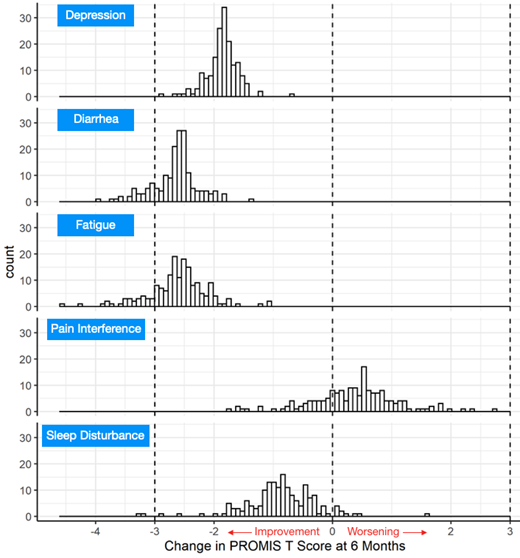Background: Treatment of chronic myeloid leukemia (CML) with a tyrosine kinase inhibitor (TKI) offers significant improvements over previous treatments in terms of survival and toxicity yet has been associated with reduced health-related quality of life and very high cost. Discontinuing TKIs with regular monitoring is safe, but little is known about the impact of discontinuation on patient-reported outcomes (PROs). In the largest U.S. study to date, we evaluated molecular recurrence of CML and PROs after TKI discontinuation.
Methods: The Life After Stopping TKIs (LAST) study was a prospective single-group longitudinal study. Key inclusion criteria were age > 18 years, patient on TKI therapy (imatinib, dasatinib, nilotinib, or bosutinib) for > 3 years with documented BCR-ABL < 0.01% by PCR for > 2 years, and no previous TKI resistance. We monitored disease outcome (PCRs by central lab) and PROs (PROMIS computerized adaptive tests via REDCap) monthly for the first 6 months, every 2 months until 24 months, then every 3 months until 36 months. Molecular recurrence was defined as > 0.1% BCR-ABL IS by central lab (loss of major molecular response [MMR]). We considered 3 points to be clinically meaningful and hypothesized that by 6 months after TKI discontinuation, fatigue, depression, sleep disturbance, and diarrhea would improve by at least 3 points each, corresponding to a standardized effect size of 0.3. Given reports of a withdrawal syndrome of musculoskeletal pain in some patients after discontinuation, pain was an additional outcome of particular interest. For each PRO domain, we estimated a polynomial piecewise linear mixed effects model that specified one nonlinear trajectory after TKI discontinuation and, for those with molecular recurrence, another trajectory after TKI restart. The models included patient-level random effects for the intercepts and linear slopes.
Results: From 12/2014 to 12/2016, 172 patients enrolled from 14 U.S. sites. Median age was 60 years (range 21-86) and 89 (52%) were female. The median time on TKI prior to enrollment was 81 months (IQR 54-123). With a minimum follow-up of 24 months, 107 (62%) patients remained in a treatment free remission (TFR). Reasons for restarting therapy were: loss of MMR by central (n=56) or local (n=2) lab, patient decision (n=4), and withdrawal syndrome (n=3). Missing PRO data was minimal (< 5%) with > 2000 assessments completed. For patients in TFR at 6 months, the average estimated improvement in fatigue was 2.6 points (95% CI 2.5-2.7), depression was 1.9 points (95% CI 1.8-1.9), sleep disturbance was 0.9 points (95% CI 0.8-1.0), and diarrhea was 2.7 points (95% CI 2.6-2.7). The average estimated worsening in pain interference (i.e., the extent to which pain affects daily life) was 0.4 points (95% CI 0.3-0.5). The figure shows the distribution of estimated change for each domain at 6 months. All patients showed improvements in depression, diarrhea, and fatigue. About 1 in 6 patients (17%) experienced a clinically meaningful (i.e., at least 3 points) improvement in fatigue and/or diarrhea at 6 months.
Conclusion: The LAST study is the largest US TKI discontinuation study to date, and the first to include comprehensive PRO measurement. For patients in TFR at 6 months, TKI discontinuation conferred modest benefits in fatigue and diarrhea on average, with a negligible increase in pain interference. Some patients experienced more notable improvements in fatigue and diarrhea. Planned secondary analyses will include change over time up to 3 years and evaluation of additional PRO domains, including anxiety, physical function, social function, and sexual function. Our results provide important new evidence to support shared patient-provider clinical decision making regarding TKI discontinuation for patients with CML.
Radich:Novartis: Other: RNA Sequencing; TwinStrand Biosciences: Research Funding. Mauro:Pfizer: Consultancy; Takeda: Consultancy; Novartis Oncology: Consultancy, Research Funding; Bristol-Myers Squibb: Consultancy. Pinilla Ibarz:Sanofi: Speakers Bureau; Abbvie: Consultancy, Speakers Bureau; Teva: Consultancy; Janssen: Consultancy, Speakers Bureau; Novartis: Consultancy; Takeda: Consultancy, Speakers Bureau; Bayer: Speakers Bureau; TG Therapeutics: Consultancy; Bristol-Myers Squibb: Consultancy. Larson:Celgene: Consultancy; Novartis: Honoraria, Other: Contracts for clinical trials; Agios: Consultancy. Oehler:Blueprint Medicines: Consultancy; NCCN: Consultancy; Pfizer Inc.: Research Funding. Deininger:Humana: Honoraria; Incyte: Honoraria; Blueprint: Consultancy, Honoraria, Membership on an entity's Board of Directors or advisory committees; Pfizer: Consultancy, Honoraria, Research Funding; Ascentage Pharma: Consultancy, Honoraria; TRM: Consultancy; Sangoma: Consultancy; Fusion Pharma: Consultancy; Adelphi: Consultancy; Takeda: Honoraria, Membership on an entity's Board of Directors or advisory committees; Novartis: Honoraria; Sangamo: Consultancy. Shah:Bristol-Myers Squibb: Research Funding. Ritchie:Tolero: Other: Advisory board; Celgene: Other: Advisory board; Celgene, Novartis: Other: travel support; Jazz Pharmaceuticals: Research Funding; Celgene, Incyte, Novartis, Pfizer: Consultancy; AStella, Bristol-Myers Squibb, Novartis, NS Pharma, Pfizer: Research Funding; Ariad, Celgene, Incyte, Novartis: Speakers Bureau; Genentech: Other: Advisory board; Pfizer: Other: Advisory board, travel support; agios: Other: Advisory board. Silver:PharmEssentia: Consultancy, Honoraria, Membership on an entity's Board of Directors or advisory committees. Cortes:Sun Pharma: Research Funding; Pfizer: Consultancy, Honoraria, Research Funding; Forma Therapeutics: Consultancy, Honoraria, Research Funding; BiolineRx: Consultancy; Bristol-Myers Squibb: Consultancy, Research Funding; Takeda: Consultancy, Research Funding; Novartis: Consultancy, Honoraria, Research Funding; Daiichi Sankyo: Consultancy, Honoraria, Research Funding; Jazz Pharmaceuticals: Consultancy, Research Funding; Biopath Holdings: Consultancy, Honoraria; Immunogen: Consultancy, Honoraria, Research Funding; Merus: Consultancy, Honoraria, Research Funding; Astellas Pharma: Consultancy, Honoraria, Research Funding. Atallah:Jazz: Consultancy; Helsinn: Consultancy; Pfizer: Consultancy; Takeda: Consultancy, Research Funding; Jazz: Consultancy; Helsinn: Consultancy; Novartis: Consultancy.
Author notes
Asterisk with author names denotes non-ASH members.


This feature is available to Subscribers Only
Sign In or Create an Account Close Modal